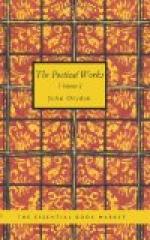To this hell’s agent:
Royal youth, fix here, 240
Let interest be the star by which you
steer.
Hence to repose your trust in me was wise,
Whose interest most in your advancement
lies.
A tie so firm as always will avail,
When friendship, nature, and religion
fail;
On ours the safety of the crowd depends;
Secure the crowd, and we obtain our ends,
Whom I will cause so far our guilt to
share,
Till they are made our champions by their
fear.
What opposition can your rival bring,
250
While Sanhedrims are jealous of the king?
His strength as yet in David’s friendship
lies,
And what can David’s self without
supplies?
Who with exclusive bills must now dispense,
Debar the heir, or starve in his defence.
Conditions which our elders ne’er
will quit,
And David’s justice never can admit.
Or forced by wants his brother to betray,
To your ambition next he clears the way;
For if succession once to nought they
bring, 260
Their next advance removes the present
king:
Persisting else his senates to dissolve,
In equal hazard shall his reign involve.
Our tribes, whom Pharaoh’s power
so much alarms,
Shall rise without their prince to oppose
his arms;
Nor boots it on what cause at first they
join,
Their troops, once up, are tools for our
design.
At least such subtle covenants shall be
made,
Till peace itself is war in masquerade.
Associations of mysterious sense,
270
Against, but seeming for, the king’s
defence:
Even on their courts of justice fetters
draw,
And from our agents muzzle up their law.
By which a conquest if we fail to make,
’Tis a drawn game at worst, and
we secure our stake.
He said, and for the dire success
depends
On various sects, by common guilt made
friends.
Whose heads, though ne’er so differing
in their creed,
I’ th’ point of treason yet
were well agreed.
’Mongst these, extorting Ishban
first appears, 280
Pursued by a meagre troop of bankrupt
heirs.
Blest times when Ishban, he whose occupation
So long has been to cheat, reforms the
nation!
Ishban of conscience suited to his trade,
As good a saint as usurer ever made.
Yet Mammon has not so engross’d
him quite,
But Belial lays as large a claim of spite;
Who, for those pardons from his prince
he draws,
Returns reproaches, and cries up the cause.
That year in which the city he did sway,
290
He left rebellion in a hopeful way,
Yet his ambition once was found so bold,
To offer talents of extorted gold;
Could David’s wants have so been
bribed, to shame
And scandalize our peerage with his name;
For which, his dear sedition he’d




